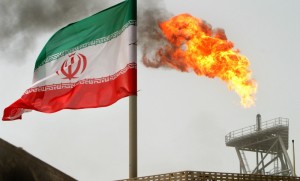 Iran appears to be putting its immediate economic and strategic needs ahead of religious solidarity as it seeks to promote ties with neighbouring Pakistan.
Iran appears to be putting its immediate economic and strategic needs ahead of religious solidarity as it seeks to promote ties with neighbouring Pakistan.Judging from a recent visit to Iran by Pakistani President Asef Ali Zardari, the two countries are more interested in improving their bilateral ties than in engaging in accusations over recent religious atrocities in Pakistan or resurrecting their support for rival factions in Afghanistan as international forces there depart.
Considering Iran�s strong pro-Shiite stance, one would have expected that the recent killing of over 100 Pakistani Shiites by a militant Salafi Sunni extremist group, Lashkar-e-Jhangvi, would have been one of the main topics discussed during Zardari�s two-day visit to Iran, which ended Feb. 28.
Instead, the issue was overshadowed by the so-called �Peace Pipeline� project, which aims to send Iranian natural gas to energy-poor Pakistan.
In the meeting between Zardari and Iran�s Supreme Leader, Ayatollah Ali Khamenei, the issue of religious unrest in Pakistan was discussed only briefly. Khamenei�said�he regretted the religious killings in Pakistan�and called for bold actions to preserve �Pakistan�s national unity�.
The�Iranian media blamed the killings�on �Wahhabi terrorists, supported by the U.S. and Zionist regimes��rather than on the Pakistani government for failing to protect Shiites.
Iran�s lack of active support for Shiites in Pakistan could also be attributed to the fact that Pakistani Shiites are very diverse and some groups are not necessarily great fans of Iran�s model of theocratic rule.
The highlight of the Zardari-Khamenei meeting was a discussion of �Pakistan�s energy needs�. �In this region,� the�ayatollah stated, �Only the Islamic Republic of Iran possesses safe energy resources and we are prepared to provide Pakistan with its energy needs.�
Zardari was quoted as saying that �the attempt by the international and regional players to prevent strengthening relations between Iran and Pakistan is a failed attempt as the nations have learned to act against Islam�s enemies.�
At present, Turkey is the only major importer of Iran�s large gas resources, purchasing about 30 million cubic metres per day. That is just a small fraction of the 600 million cubic metres a day that Iran, whose gas resources are second only to Russia, produces.
Most of the production is consumed domestically since the country lacks the means to export the gas as liquid or to stockpile it. Work has begun on another pipeline from Iran to Iraq and Syria that was approved by the Iraqi cabinet last month but it is questionable how quickly that project can be completed, especially given the deteriorating security conditions in Syria.
Considering the impact of sanctions on Iran, the leadership seeks stronger ties with South Asia for two reasons.
First, to demonstrate to the Iranian people that more countries are resisting U.S. pressure. Second, Iran hopes that joint projects that involve the interest of neighbouring countries, some of them U.S. allies, could deter military strikes against this infrastructure.
At the same time, Pakistan is facing a growing energy crisis which has caused severe electricity shortages in the country.
The �Peace� pipeline originates from the South Pars gas field in Iran�s southern city of Asalouyeh. It is to pass through Bandar Abbas and Iranshahr, in Iran�s Sistan-Baluchistan province, until it reaches Khuzdar, in Pakistan�s Baluchistan province. From Khuzdar, the pipeline would continue through Sui to Multan with one extension going to Karachi.
The part of the project that is on the Iranian side is close to completion. Since Pakistan lacks the funds to start building the pipeline on its territory, Iran has offered to provide 500 million dollars, one third of the required amount, to start the project, beginning later this month.
The Barack Obama administration has�warned Pakistan��to avoid any sanctionable activity� even while recognising Pakistan�s growing needs for more energy resources.
Pakistan�s media has supported the gas pipeline with Iran and�questioned the benefit�of the strategic alliance between the U.S. and Pakistan.
Other media accused the U.S. of a�double standard�in its foreign policy for �threatening Pakistan with sanctions for its ties with Iran, while Russia, China and India have very close economic and political ties with Iran.�
Both Pakistan and Iran face the challenge of ethnic and sectarian unrest. Unlike in Iraq and Afghanistan, Iran has not played that card with Pakistan. This could relate to the fact that Pakistan could retaliate by actively supporting the Jundollah militant group in Sistan-Baluschistan province, one of Iran�s most sensitive and volatile regions.
Iran has criticised �the shortcomings� of Pakistani government forces for failing to prevent Baluch militants from attacking Iran, but the Tehran government has avoided confronting the Pakistan government over this issue.
The Iran-Pakistan relationship goes beyond the Peace Pipeline and it is more vital for Iran than for Pakistan. Pakistan has helped Iran develop its nuclear programme and Iran may be considering Pakistan a potential ally in the case of confrontation with the United States or Israel.
Iran�s policy towards Pakistan is an example of how economic priorities supersede ideology. However, it remains to be seen if projects such as the Peace Pipeline will be the start of strategic alliance between the two large Muslim countries.
Such an alliance would have major impact on the geopolitics of the region and could be critically important in the aftermath of international forces� departure from Afghanistan.
By Lobelog
The Iran Project is not responsible for the content of quoted articles.










